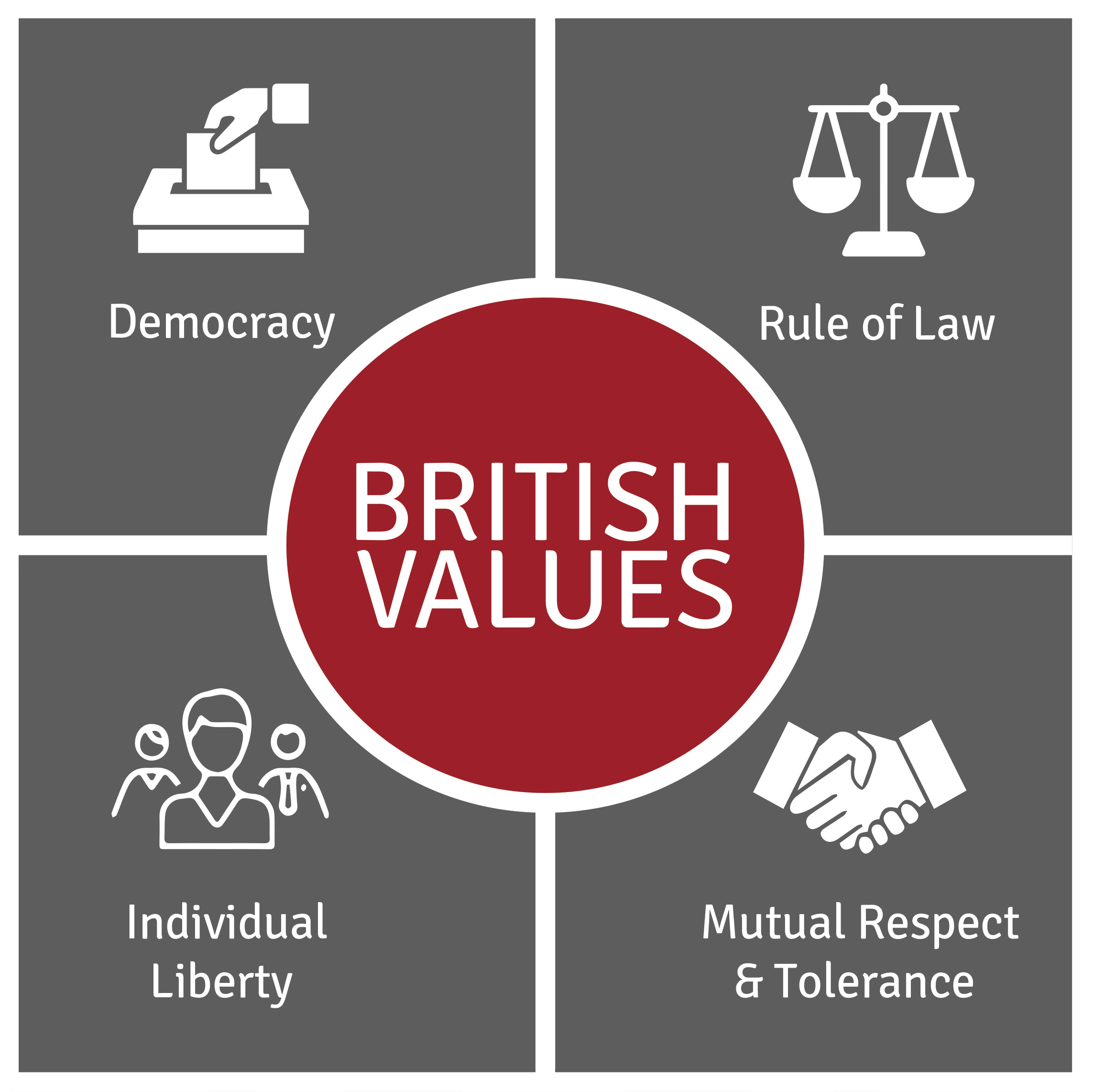British Values
At Hall Cross Academy we are committed, through the Hall Cross Learner values, to preparing students for their adult life beyond school and ensure that we promote and reinforce British Values to all our students.

The five key British Values are:
Democracy
Democracy plays a key role within day to day life of our Academy. Students have the opportunity to have their voices heard through our Key Stage Student Councils and elections. Students are invited to play a part in our school development process, informing policy changes and implementation such as the rewards scheme and ‘Hall Cross Learner’ values, through a number of student voice activities throughout the year. Our students take part each year in a formal election process to elect KS3 and KS5 Head Boy and Girl using the local council ballot boxes.
Through the English and ‘Life’ curriculums and, at KS5, the ‘Debate Club’, students are taught the skill of debating and voting and annually the Academy participate in a national debating competition.
The rule of law
The importance of laws, whether they are those that govern the class, the Academy or the country, are reinforced during the Academy day, as well as when dealing with behaviour and through assemblies, the ‘Life’ programme and ‘Stop the Clock’ days. Students are taught the value and reasons behind laws, that they govern and protect us, the responsibilities that this involves and the consequences when laws are broken. Visits from community authority figures such as the PCSO help reinforce this message. All students sign an ICT Acceptable Usage Policy as well as a classroom contract in Year 7.
Individual liberty
Within the Academy students are actively encouraged to think creatively and make choices, knowing that they are in a safe and supportive environment. Students are encouraged to know, understand and exercise their rights and personal freedoms as well teaching them that how they act can impact positively and negatively on others. They are advised how to exercise these freedoms safely, for example through our e-Safety and ‘Life’ lessons. Whether it is through choice of challenge, how they record work or participate in our numerous extra-curricular clubs and opportunities, students are given the freedom to make choices furthering the Hall Cross Learner value of ‘independence’.
Mutual respect
Respect for each other, for our Academy and to others in our community is an integral part of being a ‘Hall Cross Learner’, the school ethos and Behaviour Policy. Students see staff model this by treating each other with respect and courtesy and we promote this in the way our students interact with each other in their classes and during social times. Mutual respect and fair play is also discussed within sports based activities. We teach students about the unfairness of discrimination based on someone’s faith, culture or beliefs through the ‘Life’ programme of study. We run charity events to actively promote mutual respect for all groups in society.
Tolerance of those of different faiths and beliefs
This is achieved through enhancing students understanding of their place in a culturally diverse society. Opportunities to share and discuss this message occur through assemblies and discussions involving prejudices and prejudice-based bullying are promoted through the ‘Life’ and Philosophy and Ethics curriculums and ‘Anti-Bullying’ work, as well as taking opportunities to tackle this during every day school life.
SMSC
The Spiritual, Moral, Social and Cultural (SMSC) development of our students has always been at the heart of the education offered at Hall Cross Academy. Our approach to SMSC is embedded in the ethos of our Hall Cross Learner profile including mutual respect, pride, team working and collaboration; an approach that we believe is fundamental to a full and positive participation in life in modern Britain.
We support the spiritual development of our pupils to enable them to develop their:
Ability to be reflective about their own beliefs, religious or otherwise, that inform their perspective on life and their interest in and respect for different people’s faiths, feelings and values;
Sense of enjoyment and fascination in learning about themselves, others and the world around them;
Use of imagination and creativity in their learning; and
Willingness to reflect on their experiences.
We support the moral development of our pupils to enable them to develop their:
Ability to recognise the difference between right and wrong, and to apply this understanding in their own lives and, in so doing, respect the civil and criminal law of England;
Understanding of the consequences of their behaviour and actions; and
Interest in investigating and offering reasoned views about moral and ethical issues, and being able to understand and appreciate the viewpoints of others on these issues.
We support the social development of our pupils to enable them to develop their:
Use of a range of social skills in different contexts, including working and socialising with pupils from different religious, ethnic and socio-economic backgrounds;
Willingness to participate in a variety of communities and social settings, including by volunteering, cooperating well with others and being able to resolve conflicts effectively;
Acceptance and engagement with the fundamental British values of democracy, the rule of law, individual liberty and mutual respect and tolerance of those with different faiths and beliefs;
We support the cultural development of our pupils to enable them to develop their:
Understanding and appreciation of the wide range of cultural influences that have shaped their own heritage and that of others;
Understanding and appreciation of the range of different cultures within school and further afield as an essential element of their preparation for life in modern Britain;
Knowledge of Britain’s democratic parliamentary system and its central role in shaping our history and values, and in continuing to develop Britain;
Willingness to participate in and respond positively to artistic, sporting and cultural opportunities;
Interest in exploring, improving understanding of and showing respect for different faiths and cultural diversity.
Tolerance towards different religious, ethnic and socio-economic groups in the local, national and global communities.
These are the skills and attitudes we believe will allow our students to participate fully in and contribute positively to life in modern Britain.





